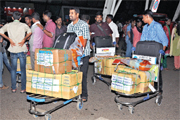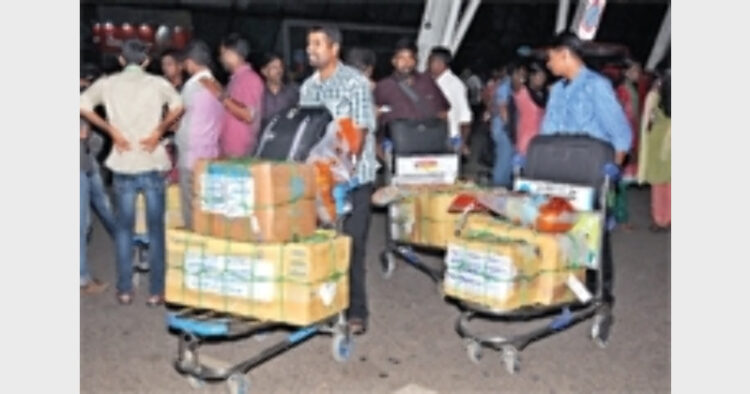 The fall in prices of crude oil may be good news, but if the trend continues, it will start to affect Non-Resident Keralites (NRKs) working in oil economies in West Asia
The fall in prices of crude oil may be good news, but if the trend continues, it will start to affect Non-Resident Keralites (NRKs) working in oil economies in West Asia
The Gulf-based non-resident Bharateeyas are in a melancholic mood. What worries the NRIs, mostly Malayalees, is the crisis looming large over the economy of Gulf countries. True to the saying “Only the wearer knows where the shoe pinches”, the immediate impact of the economic slowdown in the region is worst being experienced by the expatriate population. They are being forced to tighten their purse strings as they can earn only less and hence save less than they used to. Many have started packing off their families back to the home land with a view to minimise expenses. There is a long waiting list of applicants from among NRIs’ children seeking admission to schools and colleges here in the coming academic year. The lavish life style of the NRI families will soon become a nostalgic memory. All because of the unprecedented crash in crude oil prices.
Reports in a section of the international media have been suggesting, for quite some time an imminent economic crisis in the West Asia. There were also observations by some economists that it could be a passing phase. But the recent report by the International Monetary Fund (IMF) calls for concern. The report confirms the worst fears that the good old days of Gulf countries would never be there again at least for the coming few years. What next, depends on how these petro-dollar based economies adjust themselves either by economy measures or by diversifying into new areas of economic activity like trade, tourism and agriculture. Putting all eggs in oil is no more advisable or affordable for the Gulf countries.
The slow down is at its worst in Saudi Arabia, Iraq and Libya as they are solely dependent on crude oil prices. Kuwait, Qatar and United Arab Emirates (UAE) are able to hold on for some time more, having already diversified into new areas of production. On the contrary, Saudi Arabia, Bahrain, Libya, Yemen, Iraq, Iran etc find it extremely tough to cope with the new situation. Also their refusal to borrow, has upset their annual budgets with huge uncovered deficits. The budgets of Gulf Cooperation Council (GCC) face an average deficit of 13 per cent of GDP. Their combined budget deficit over the next five years is expected to exceed USD 1 trillion according to IMF. Kuwait, Qatar and UAE are able to manage with the buffer stock they already have. Saudi Arabia, according to the IMF report, will have to come to terms with the new situation failing which it will be disastrous. It will be foolish and futile for the country to focus on oil, as the price of crude which was around USD 106 per barrel has crashed to USD 40. The gap between the international price and domestic price is too huge to be bridged. There was some relief in between, with the oil prices rising a bit. But this again is being attributed to the severe winter in Russia and Iran. The forecast is that worse days are ahead with oil prices going further down in the days to come. The general talk is that crude oil is of late already cheaper than water.
Having lost the monopoly, the oil producing countries can no more form a cartel and dictate terms to the rest of the world. The threat posed to oil by Shale gas will only loom larger in the years to come. Shale Gas could meet only one per cent of the US demand in the year 2000. But by 2010 it met more than twenty per cent of the demand in US. China is also reportedly going ahead with Shale gas of late. For the US and also others, there are also
obvious political and diplomatic reasons in addition to economic reasons to reduce the dependence on oil
producing countries. They, therefore, heave a sigh of relief now that crude prices are its lowest.
The Gulf region did experience recession eight years back, in 2008 and earlier about thirty years back in 1986. Those were only for a brief period and had little far reaching consequences. But today the Gulf is a region of economic uncertainty. The Gulf-based NRIs are therefore in a dilemma, whether to continue there or to come back home. There is no panic situation as of now. But the expatriates have already started feeling the pinch. The economy measures initiated by Gulf regimes include deep cuts in subsidies not only for petrol, but also for electricity and even meat products and water. NRIs had been enjoying subsidies on several items for the past three or four decades ever since the oil boom of the seventies and eighties. Bahrain was offering the highest subsidy of seventy per cent. This is now being drastically cut in phased manner. Also meat subsidy has been axed by Bahrain. In UAE, oil prices have been deregulated since August last while Qatar hiked petrol prices by thirty per cent from last month onwards. Saudi Arabia increased gasoline prices by forty per cent in December last. Simultaneously in all Gulf countries, fresh taxes are also on cards. Being proposed is a uniform value added tax for the next three to five years. GCC countries were so far mostly tax free. Further wage cut to staff and minimising staff strength in companies is also common.
Nonetheless, there is yet to be any exodus from the Gulf countries unlike during the Kuwait war. But the trickling has started and it is straight though slow. A report by the Centre for Development Studies (CDS) says that about fifty per cent of the total emigrant population has returned to Kerala, the state which accounts for the major chunk of NRIs in the Gulf. The socio-economic impact could indeed pose a challenge to the State.
Hari S Kartha (The writer is Senior Executive Editor, Amrita TV)













Comments